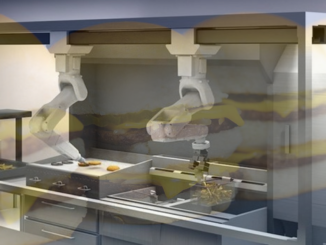
By Jeff Zabin - 4.30.2019
When it comes to restaurant technology, there tends to be a singularity of focus on computer hardware and software geared to improving business operations, reducing costs, increasing profitability, and enhancing the guest experience to drive loyalty. In other words: the financial benefits. Notably, technology innovation related to food waste reduction (which, granted, also has financial benefits) is also now starting to receive significant notice, as reported here.
Also worthy of attention in the context of restaurant technology is innovation as it relates not only to computer hardware and software but also to actual food production and ingredients. And perhaps no food production innovation is currently having a great effect on the restaurant industry than that related to the advent of plant-based meat and other vegan food sources. This restaurant technology is poised to have a monumental impact. And that’s a good thing.
Today we’re witnessing a societal shift as more and more people are reducing, and even eliminating, meat consumption. This is largely due to a growing awareness of the health consequences. Last year, the World Health Organization classified processed meat as a carcinogen and red meat as a probable carcinogen. There is also a growing awareness of the atrocities of animal suffering taking place on factory farms, in particular, with billions of thinking, feeling animals living their short lives in horrid conditions and then being brutally slaughtered.
There is also an increased awareness of the environmental impact of factory farming. According to some estimates, livestock production is responsible for more than 50 percent of global greenhouse gas emissions, not to mention massive water consumption (animal farming is responsible for upwards of 33 percent of all freshwater use in the world) and contamination.
Consumer response to this awareness, coupled with major breakthroughs in food science, is driving a global market for meat substitutes now forecast to reach an estimated $6.5 billion over the next five years. A growing number of major restaurant companies, including household name fast food brands, are jumping on the bandwagon, adding plant-based alternatives to their menus and generating loads of favorable publicity in the process.
Among these plant-based alternatives are burgers from Impossible Foods, which White Castle introduced last year in the form of sliders at 380 of its locations across the United States. The meat alternative mimics the taste, look and texture of traditional sliders to the point of being almost indistinguishable. It is notable that, founded in 1921 in Wichita, Kansas, White Castle is commonly regarded as the world’s first fast-food chain and is also known as the inventor of the slider.
Other major chains, including Carl’s Jr. and A&W, have introduced plant-based burgers from other leaders, including Beyond Meat, in this burgeoning marketplace. Beyond Meat is scheduled to IPO next month with a market value that analysts now expect to reach $1.2 billion.
Earlier this month, Red Robin announced that it will add the Impossible Burger to the menu at all 570 of its locations. And then, just two weeks later, came the biggest news of all related to the foray of plant-based meats into the world of fast food restaurants.

Following a successful trial run at 57 Burger King locations in St. Louis, Restaurant Brands International, Burger King’s parent company, announced that it will launch the “Impossible Whopper” as a plant-based alternative to its traditional burger at all 7,300 Burger King locations in the United States. Impossible is currently building a second production facility just to accommodate the anticipated spike in demand from the fast food giant.
The advent of vegan burgers in the largest mainstream fast food restaurants is the culmination of years of food science and technology. Transforming our approach to food production and consumption from one that relies heavily on animal products to one that is plant-based represents an important advance of human progress in a fundamental and profound way. The shift is an essential part of the solution to living in a world that is environmentally healthy and has a food supply sufficient to feed the world population, which is estimated to reach 9.7 billion people by 2050.
In less than a century, particularly, within just the past few decades, animal farming has come to pose an existential threat to the planet and all its inhabitants. The threat is not hypothetical. A catastrophe of our own making is unfolding before our eyes on a global scale and at an ever-quickening pace. The fact that restaurant chains that serve billions of meals a year are adopting their menus to this new reality offers a small glimmer of hope.
Beyond plant-based alternatives to animal products, some companies are also gearing up to introduce “clean meat” or cultured meat products. This groundbreaking technology is likely to further revolutionize the global food system over the next decade and also quickly make its way to restaurant menus. Instead of obtaining meat from animals raised on factory farms and killed in slaughterhouses, clean meat is produced by taking a small sample of animal cells and replicating these cells in a culture outside of the animal. The resulting product is real meat, but without the animal suffering and environmental devastation and also without the antibiotics, hormones, salmonella, and fecal matter contamination.
Plant-based meat and clean meat represent a natural evolution of animal farming. There are countless examples in human history of a superior, more economical and safer product replacing its inferior predecessor thanks to technology innovation. Think of the throngs of horse-pulling wagons that traveled the streets of every major city prior to the invention of the “horseless carriage” or the whale oil lamps that lit people’s homes prior to the advent of kerosene lamps followed by the electric incandescent light bulb.
Producing meat and dairy through animal farming is an enormously wasteful, cruel and expensive process that is unsustainable. With the introduction and proliferation of plant-based and cellular foods that are equally (or more) tasty, affordable and nutritious, change is certain to happen even amongst people who would otherwise be loath to change their eating behavior. The fact that major fast food chains are now adding vegan burgers as featured menu items nationwide following successful trials represents an enormous sea change.
Speaking of sea change, it’s not just burgers. Plant-based seafood is another category ripe for growth. Ocean Hugger Foods and Good Catch Foods are among the up and comers pioneering plant-based seafood, using ingredients like tomatoes, eggplant and legumes to mimic the taste and consistency of tuna, salmon, eel, and other fish. Analysts predict that plant-based seafood will grow to become a multi-billion-dollar market in the next decade, skyrocketing in a similar way to that of the dairy-free milk market.

Sustainable seafood is as much an oxymoron as the term jumbo shrimp, a seafood that, unfortunately, has devastating environmental impact, given that shrimp farmers have already destroyed an estimated 38 percent of the world’s mangroves to create shrimp ponds. Meanwhile, deep-sea trawlers kill up to 20 pounds of so-called “bycatch” (unwanted species of fish accidentally scooped up by nets) for every pound of shrimp. A dirty secret of the seafood rating system that marks some fish as “sustainable” is that marine mammals like dolphins, whales, seals, birds, sharks, turtles are also victims of the wide cast nets.
The United Nations estimates that 85 percent of the world’s commercial fish populations are in decline. Many species are on the verge of total collapse. Sustainable seafood is a myth. It is mere fantasy given the fact that 90 percent of large fish populations have been wiped out over just the past few decades, leaving the oceans in critical condition.
“Sustainable seafood” also masks a horrible reality. That reality is that billions of marine animals die every year and ocean life on the whole is being driven to the brink of extinction due to human seafood production and consumption. With rising greenhouse gas emissions – produced, in large part, by animal farming – radically changing the chemical composition of our seas, our entire ocean ecosystem is now in peril.
Industrial aquaculture farms labeled as “sustainable” tend to be large-scale polluters that are only hastening the demise of our oceans. Farmed fish are grown in abhorrent conditions and those that escape into the open seas spread diseases to the wild fish populations, often causing even more massive destruction. The fishing industry burns through millions of gallons of fuel chasing these declining fish stocks in ever-more remote regions of the globe.
The seafood industry gives people a false sense of comfort by evoking the word “sustainable.” According to leading marine biologists, our only remaining weapon to combat overfishing is complete abstinence from eating seafood. The good news is that plant-based products are delicious, healthy and far removed from the brutal practices that are quickly turning our wild oceans into dead oceans. It seems certain that plant-based seafood will make its way into sushi joints in the same way that plant-based meats are now showing up en masse at fast food burger chains. And when that happens, it won’t be a minute too soon.



